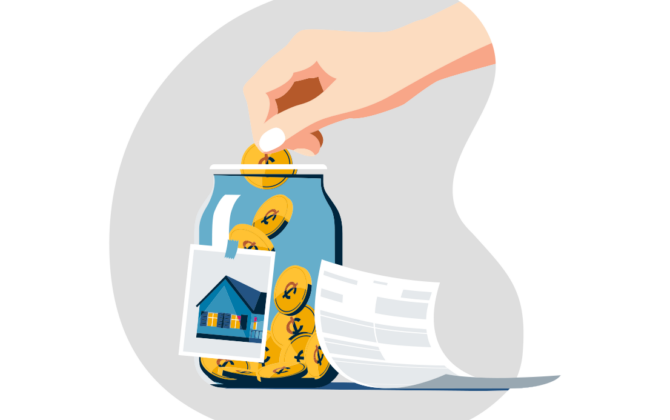How Much of a Down Payment Do You Need to Buy a House?
How much a down payment do you need to buy on a house? There’s no one right answer —the number will be different for everyone — but 20% is often mentioned as the ideal.


How much down payment do you need to buy a house? There’s no one right answer – the number will be different for everyone – but 20% is often mentioned as the ideal. A down payment is usually specified as a percentage of the value of the house you’re looking to buy, so if you’re looking at a $500,000 house, a 20% down payment would be $100,000. Whatever the price of the house you’re looking at, 20% is going to be a lot of money. Not everyone will have that readily available, and it can take a while to save up. But never fear – wherever you are on your savings journey, there are different mortgage options available to you.
One of the most popular mortgage options is a “conventional mortgage.” This mortgage conforms to the standards set by Fannie Mac and Freddie Mac, two government-sponsored entities that insure mortgages made by lenders. To qualify for a conventional mortgage, the borrower must have enough money for a 20% down payment (this is why 20% is often thought to be the ideal). If you don’t have that saved up, you should still be able to get a mortgage, but it will likely be more expensive.
One of the ways it gets more expensive is you’ll probably be offered a higher interest rate than you might receive with a conventional mortgage. Another way it can get more expensive is that most lenders will require you to get Private Mortgage Insurance (PMI).
Let’s take a look at how your down payment can impact your mortgage. Use our down payment calculator below to estimate your monthly payment as you adjust your expected down payment amount.
How does my down payment impact my mortgage?
Estimate the financial impact of your down payment using this simple calculator.
Your Estimated Mortgage Results
-
$0
Monthly Payment
-
$0
Total Loan Amount
-
$0
Total Interest Paid
What is Private Mortgage Insurance (PMI)?
PMI protects the lender in the event you’re unable to make your mortgage payments. But it’s an added monthly cost (or a big one-time cost) for you that typically ranges between $30-$70 per month for every $100,000 borrowed.[1] You’ll have to pay this until you build up 20% equity in your home. The smaller your down payment, the larger the PMI you’ll probably have to get. Other factors that affect the PMI you’ll have to pay are[2]:
- your credit score (the higher your score, the lower your PMI)
- the type of mortgage (a conventional mortgage could have a higher PMI than Federal Housing Administration t(FHA) loan)
- the local housing market conditions (if property values are rising in your neighborhood, you may pay a lower PMI or if the value of your home has risen, over 20%, you may no longer have to pay a PMI)
Saving up for a down payment equal to 20% of the value of your prospective home can take a long time. And paying for PMI can be an added burden. Luckily for doctors and dentists, there’s another option: physician mortgages.
What is a Physician Mortgage?
Many physicians are carrying significant student loan debt, which can deter some lenders from offering them mortgages. And due to their debt load, they may not have enough money to put together a significant down payment. However, given their creditworthiness and strong earnings potential, physicians are typically low risk borrowers, and some lenders, including Laurel Road, recognize that. That’s why Physician mortgages can be a good option.
Physician mortgages recognize the unique circumstances some doctors and dentists face when they’re looking for a mortgage. The terms vary from lender to lender, but qualifying physicians can often put little to no money down, and in some cases, the physician may not even have to be working in order to qualify.
Who is eligible for a Physician Mortgage?
The exact list of who is eligible for a physician mortgage varies by lender, but often includes:
- Interns, residents, fellows, clinical professors, researchers, and managing physicians with a current license and degree
- Physicians or dentists with the following degrees:
- Doctor of Medicine (MD)
- Doctor of Osteopathic Medicine (DO)
- Doctor of Dental Medicine (DMD)
- Doctor of Dental Surgery (DDS)
- Doctor of Podiatric Medicine (DPM)
As you can see, the list is fairly extensive — are you on it?
[1] https://myhome.freddiemac.com/blog/homeownership/20190913_private_mortgage_insurance.page
[2] https://www.investopedia.com/mortgage/insurance/
Information and interactive calculators are made available to you as self-help tools for your independent use and are not intended to provide investment advice, legal, financial, or tax advice. We cannot and do not guarantee their applicability or accuracy in regard to your individual circumstances. All examples are hypothetical and are for illustrative purposes. We encourage you to seek personalized advice from qualified professionals regarding all personal finance issues. Calculators do not include the fees and restrictions that certain products may have. This calculator does not indicate whether you would qualify for a Laurel Road loan. Please visit the applicable banking product pages on laurelroad.com for specific terms and conditions.
In providing this information, neither Laurel Road nor KeyBank nor its affiliates are acting as your agent or is offering any tax, financial, accounting, or legal advice.
Any third-party linked content is provided for informational purposes and should not be viewed as an endorsement by Laurel Road or KeyBank of any third-party product or service mentioned. Laurel Road’s Online Privacy Statement does not apply to third-party linked websites and you should consult the privacy disclosures of each site you visit for further information.
Don’t miss the latest financial resources.
This site is protected by reCAPTCHA and the Google Privacy Policy and Terms of Service apply.
Get tailored Laurel Road resources delivered to your inbox.
Search Results


